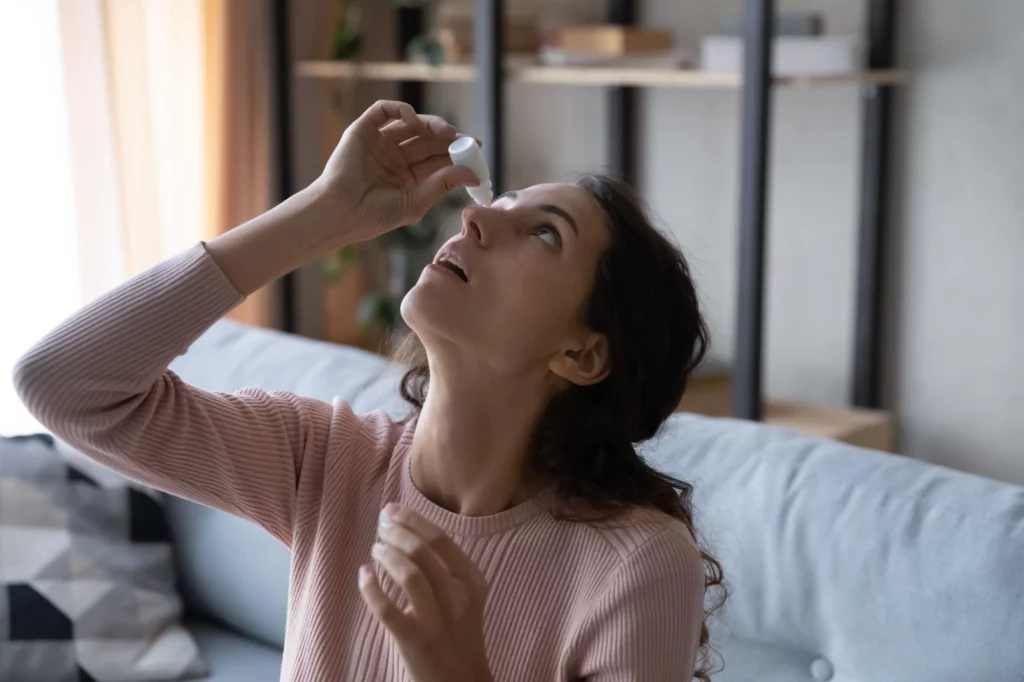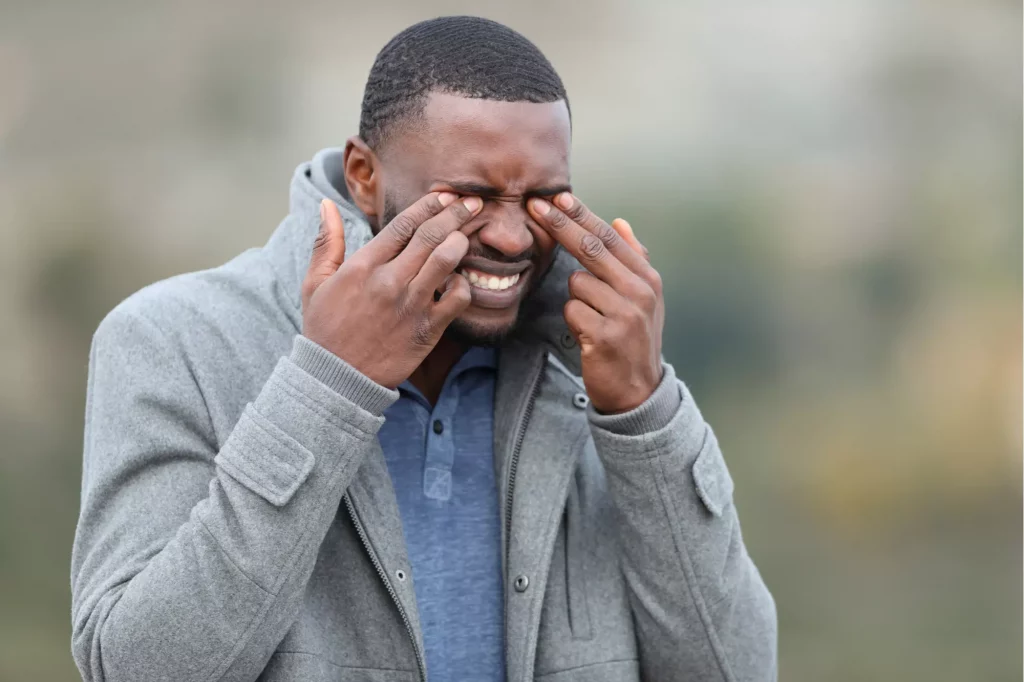Medically Reviewed by: Edward C. Wade, M.D., F.A.C.S.
Dry Eyes at Night: Causes, Symptoms, and Treatment
Most people have a basic idea of what causes dry eyes during the day but are stumped when it comes to identifying what causes dry eyes at night. What is it about the nighttime that causes so many people to experience an uptick in dry eye symptoms?
As it turns out, a surprising multitude of factors can contribute to patients experiencing dry eyes at night. Discover the reasons you may be waking up with dry, gritty eyes—and what you can do to find relief.
Understanding dry eye syndrome
Before we get into the specifics of dry eyes at night, it’s important that we cover the basics of daytime dry eye syndrome. That’s because, more often than not, daytime eye dryness contributes to patients having dry eyes at night.
Dry eye syndrome occurs when your eyes are not receiving adequate moisture in the form of tears. Tears actually have a very specific composition; they must contain the right amounts of water, mucus, oils, and antibodies to keep your eyes covered in an even and safe lubricated coat.
When something affects the rate at which tears are produced, the rate at which tears evaporate, and the composition of the tears, dry eye syndrome can occur. In other words, dry eye syndrome is typically caused by either one or a combination of the following issues:
- Tears evaporating too quickly
- Not enough tears being produced (keratoconjunctivitis sicca)
- A change in tear composition.
For more information on what environmental elements, risk factors, medications, diseases, and other conditions contribute to these three problems, please read our comprehensive article: Dry Eye Syndrome.
Dry eye syndrome symptoms
When these aberrations occur, patients are likely to experience eye discomfort (including itching, burning, and grittiness), redness, and light sensitivity.
In some cases, these conditions will “send out a signal” for more moisture, and the body will “respond” by “sending” additional tears. However, these tears will not have the same consistency as lubricating tears. As a result, those who suffer from dry eyes may actually have excessively watery eyes.
A brief note on LASIK and dry eyes
Laser eye procedures such as LASIK and PRK can also cause daytime dry eyes. While it’s common for patients to experience dry eyes after LASIK, this issue typically resolves within a month. In the meantime, your LASIK doctor will likely recommend either OTC, preservative-free eye drops after LASIK or a prescription variant.
Why is dry eye worse at night?
Wind, smoke, dry air—all of these contributing factors to dry eyes occur during the daytime. Are there any conditions in particular that lead to dry eyes at night? As a matter of fact, yes—and more than you might suspect.
Nocturnal lagophthalmos: Nocturnal lagophthalmos is your body’s inability to close the eyelids completely while you’re sleeping. It’s thought to be caused primarily by weaknesses in the facial nerves, particularly the seventh cranial nerve. If you sleep with your eyes half-open, the extra exposure of the surface of your eye to air may be causing your tears to evaporate at a faster rate than normal.
Changes in nighttime metabolism: At night, your body’s metabolism slows down and your blood pressure drops naturally. While these important changes allow your organs to rest, they can also contribute to dry eyes at night; decreased organ function means the production of fewer tears, and lower blood pressure means your eyes are receiving fewer nutrients via blood circulation.
Nighttime technology hygiene: If you’re accustomed to scrolling through Instagram to help you wind down or to falling asleep to Netflix, this extra screen time could be contributing to your dry eyes. We blink at a lower rate while looking at screens. Since blinking replenishes the lubricating layer of tears to your eyes, staring at your phone, TV, or computer for long periods can lead to eye strain and dry eyes both during the day and at night. For more info, read up on eye damage from cell phone use.
Inadequate sleep: Not getting enough sleep? Your eyes may be suffering along with the rest of your body. Your eyes need rest and benefit from a break from exposure to the air. Inadequate sleep can worsen dry eyes at night, especially if you’re staying up watching TV or if you already struggle with dry eyes during the day.
Allergies: While they do so in different ways than described above, allergies can also cause dry eyes. Check your bedroom for allergens—detergents used to wash the sheets, dust, mold, or letting pets sleep in your bed can all trigger allergies.
Air conditioning/dry air: Houstonians love their air conditioning, and for good reason. But if your air conditioner is on at full power and/or blowing directly at your face, it may be contributing to nighttime eye dryness. In much the same way, cold, dry weather can also contribute to dry eyes at night.
Is it dangerous to have dry eyes at night
While the occasional bout with dry eyes at night won’t have long term effects, chronic dry eyes can lead to complications in eye health. From blurred vision to light sensitivity and increased susceptibility to infections, scratches, and corneal abrasions, it’s best not to dismiss your chronic dry eyes as an irritating inconvenience.
For more information on these potential side effects, check out our articles What Is A Corneal Abrasion? and Why Are My Eyes Red All The Time?
What is the best treatment for dry eyes?
Depending on the severity and frequency of your experience with dry eyes at night, you may find relief by following simple home tips for dry eye relief. Those looking for how to cure dry eyes permanently may want to take a more long-term, clinical approach.
Home remedies for dry eyes at night
- Use preservative-free lubricating eye drops designed specifically for nighttime use
- Turn down the A/C (or turn it away from your face) and/or invest in a humidifier
- Commit to making an allergen-free bedroom
- Apply a warm (not hot) compress before sleeping to help retain moisture
- Warm compresses and lid scrubs can also help rid your eyelids of irritants and reduce inflammation
- Use a sleep mask or special eye tape to limit your eyes’ exposure to the air
- Limit the use of technology before bed
- Switch from contacts to glasses several hours before bedtime
- Switch to specialty contact lenses such as Scleral lenses, which are designed to keep the eye lubricated
Clinical treatments for dry eyes at night
- Prescription eye drops such as Restasis or Xiidra
- Punctal occlusion: In-office closing the duct that drains away tears
- True Tear: Use of a device that induces natural tear production via stimulation of nasal nerves
- Autologous serum tears: Tears made from a patient’s own blood serum—ideal for patients who have treatment-resistant dry eyes
- LipiFlow: Removing blockage from the meibomian glands, which produce the oil in your tears
- BlephEX: In-office cleaning of the lashes and eyelids
Don’t let dry eyes keep you awake at night. Call Eye Center of Texas.
Dealing with dry eyes at night can be both frustrating and exhausting. If home remedies aren’t effectively treating your dry eyes, call Eye Center of Texas. Our doctors and surgeons will walk you through your options and help you find the right solution for relief from nighttime dry eyes.
Wake up without feeling the irritation of dry eyes. To request an appointment, give Eye Center of Texas a call at 713-797-1010 or contact us online today.
More Helpful Resources From Eye Center of Texas:
- Knowing When to Have Cataract Surgery
- Pain Around the Eyes: What It May Mean
- Why Is There a Bump on My Eyelid?
- How to Get Rid of Excess Eyelid Skin
- How Does Diabetes Affect the Eyes?
Related Articles
Financing Options Available
Apply today to find a financing option that meets your needs.
Our Locations
Houston/Bellaire
6565 W. Loop S., Suite 650Bellaire, TX 77401
Medical Office:
713-797-1010
Medical Fax:
713-357-7276
LASIK/Near Vision:
Office: 713-395-1515
Fax: 713-357-7278
Pasadena
4415 Crenshaw RoadPasadena, TX 77504
Medical Office:
281-977-8800
Medical Fax:
281-977-8877
Sugar Land
15200 S.W. Freeway, Suite 130Sugar Land, TX 77478
Medical Office:
281-277-1010
Medical Fax:
281-277-4504
Clear Lake
455 E. Medical Center Blvd., Suite 110Webster, TX 77598
Medical Office:
281-332-1397
Medical Fax:
281-282-9152
Katy
Greenhouse Medical Plaza2051 Greenhouse Road, Suite 110
Houston, TX 77084
Medical Office:
346-547-7070
Medical Fax:
281-214-2971
The Woodlands/Conroe
100 Medical Center Blvd., Suite 118Conroe, TX 77304
Medical Office:
936-647-1610
Medical Fax:
936-647-1620


